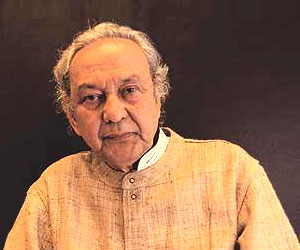SH Raza is an internationally acclaimed Indian
abstract painter. Read about the life history of his work in this
biography.
SH Raza

S.H. Raza, who was born in the year 1922 as Syed
Haider Raza, is a internationally acclaimed Indian painter. Though he
has resided and worked from France since the 1950s, yet he maintains
close association with his motherland till date. Though he incepted
doing figurative paintings, he gradually moved on to abstract later on.
Today, all his works are abstracts in either oil or acrylic with
normally use of very vibrant hues. Recently, a painting of SH Raza sold
for US 1.4 million dollars in the 2006 auction.
Here's more of SH Raza's biography. Raza attended the Nagpur School of
Art and then the Sir J. J. School of Art in Mumbai before shifting to
France in the year 1949 to study at the Ecole Nationale des Beaux-Arts
at Paris. In recognition to his marvelous contribution in the sphere of
art, the Indian government gave him the Padma Shri in the year 1981. SH
Raza is also a Fellow of the Lalit Kala Akademi at New Delhi in India.
Further on, the state government of the place of his birth, Madhya
Pradesh, awarded him the Kalidas Samman.
Raza is married to a French artist, Janine Mongillat. An active member of the
revolutionary Bombay Progressive Artists' Group, the life history of SH
Raza's career saw him paint on themes related to Western Modernism and
then he slowly shifted from Expressionist towards the abstraction mode.
Presently his works feature elements of Tantrism inspired from Indian
scriptural texts. In other words, his paintings showcasing landscapes
and townscapes during the 40's gradually metamorphosed to become
expressive abstract works.
In the inception, SH Raza was very impressed by the picturesque
countryside of rural France. His work 'Eglise', thus, captures the
undulating terrain and exotic village architecture of this region. If
his landscapes earlier were very vibrant looking, now they have donned a
more subtle tone. With time, Raza discarded the expressionistic style
totally and instead settled for the geometric abstraction and the Bindu
or dot.

